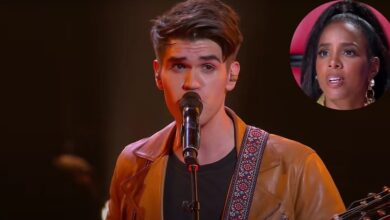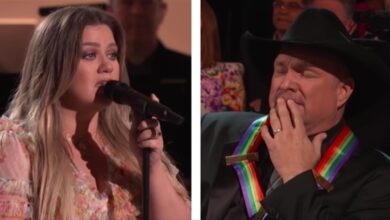Re-Recorded In Stereo, “Today I Began Loving You Again” Highlights Why Merle Is A True Legend
“Today I Started Loving You Again” stands as one of Merle Haggard’s most cherished ballads, embodying a deep sense of longing and introspection that resonates with listeners. The song, crafted by Haggard and Bonnie Owens, is not solely a reflection of rekindled love; it delves into the emotional intricacies tied to memories of past relationships. The bittersweet nature of the lyrics captures the essence of love’s complexities, exploring how easily emotions can rise anew, even after heartache.
The song’s initial release as the B-side to “The Legend of Bonnie and Clyde” in 1968 did not see immediate widespread acknowledgment. Yet, over time, it grew in popularity, ultimately cementing its status as one of Haggard’s signature tracks. The upsurge in its appreciation can be attributed to Haggard’s profound ability to encapsulate the essence of human emotion within his songwriting. As listeners found themselves in various stages of love and heartbreak, the song served as an anthem that echoed their experiences, inviting them into a shared emotional space.
Merle Haggard’s life experiences significantly informed his songwriting, often drawn from personal histories marked by both triumphs and struggles. As an artist, his voice embodies authenticity — a trait that has consistently garnered him grand acclaim. “Today I Started Loving You Again” exemplifies this authenticity through its heart-wrenching lyricism. Haggard’s exploration of the moment when love unexpectedly rekindles speaks to fundamental human experiences, bridging gaps between diverse listeners. His words evoke a relatable narrative that captures the poignant revelation of falling in love once more amidst all the complexities that define relationships.
The impact of the song was further amplified by its re-recording in stereo for the album “20 Hits, Volume 2.” This version brought an invigorated clarity and richness to Haggard’s emotive vocals, allowing them to resonate more profoundly with audiences. The enhanced sound quality brought forth deeper instrumental layers, enriching the listening experience, and emphasizing the heartfelt nature of the lyrics. Haggard’s ability to breathe new life into his music through innovative production techniques showcased his adaptability and commitment to artistry.
Throughout his illustrious career, Haggard produced an array of hits that transcended mere musical entertainment. Iconic songs such as “Mama Tried” and “Okie from Muskogee” solidified his status as one of country music’s most influential figures. Haggard’s songwriting often conveyed the sentiments of working-class Americans, reflecting their struggles and aspirations. Through a combination of personal narrative and broader social commentary, Haggard’s music remains deeply intertwined with the cultural fabric of America.
The influence of Haggard’s work extends well beyond traditional country music, leaving an indelible mark on a variety of genres. Many artists from disparate musical backgrounds have drawn inspiration from his storytelling prowess, covering his songs or embedding his lyrical narratives into their own works. This genre-blending speaks to the universal nature of Haggard’s themes, where stories of love, loss, and hope resonate regardless of musical boundaries, making him a revered figure in modern music.
Haggard not only transformed country music but also played a significant role in shaping what is known as the Bakersfield sound. This style, characterized by its raw, honest vibe, diverged from the more produced Nashville style, bringing a sense of authenticity and grit to the genre. The Bakersfield sound became a significant movement, paralleling Haggard’s own life experiences and artistic development, reinforcing the connection between an artist’s life and their craft.
The legacy of Merle Haggard continues through family, with his son, Ben Haggard, actively preserving and performing his father’s music. This continuation not only keeps the essence of Haggard’s artistry alive but also introduces his timeless narratives to new audiences. Similarly, tribute performances and concerts serve as reminders of Haggard’s lasting influence, celebrating the depth and emotional resonance found in his work. Such events illustrate the communal bond that music fosters, resonating with shared experiences of love and loss.
In analyzing “Today I Started Loving You Again,” it is evident that the song serves as a celebration of love’s potential for renewal. While it reflects on memories tinged with sorrow, it simultaneously instills a sense of hope. The interplay of past emotions against the backdrop of new realizations invites listeners to explore their own journeys of love. This universal human experience, encapsulated within the song, reinforces the relevance of Haggard’s music throughout different life stages.
Ultimately, Merle Haggard’s impact on American music and culture is immeasurable. “Today I Started Loving You Again” exemplifies not only the lyrical beauty of Haggard’s work but also the enduring nature of the themes he explored. His legacy lives on in the hearts of listeners and the stories shared through his music, solidifying his place as a cornerstone of country music history and a source of inspiration for generations to come. As time passes, the emotional depth of Haggard’s artistry continues to reverberate, demonstrating the timeless essence of love and its complexities in the human experience.
?si=TqJmqFpO7qCBoIdw





